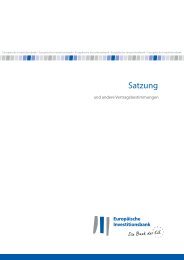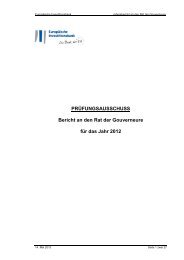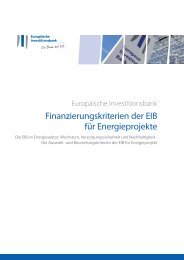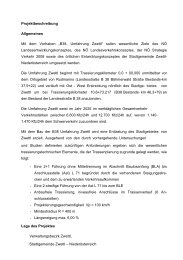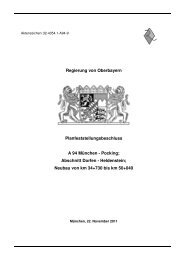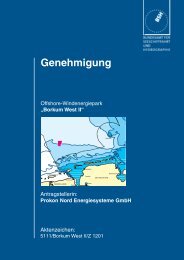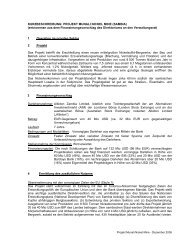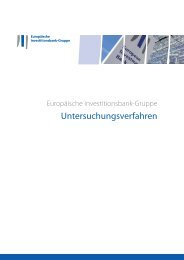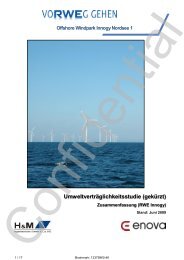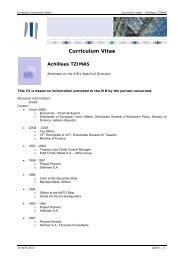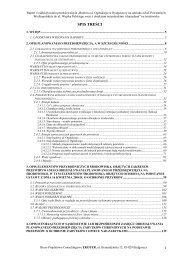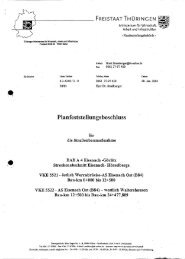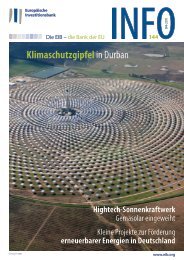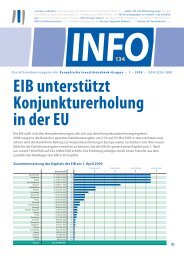Temperature - European Investment Bank
Temperature - European Investment Bank
Temperature - European Investment Bank
Create successful ePaper yourself
Turn your PDF publications into a flip-book with our unique Google optimized e-Paper software.
WEST AFRICAN POWER POOL (WAPP) PÖYRY ENERGY LTD.<br />
Mount Coffee HPP ESIA and RAP 2012-09-18<br />
ESIA Report Page 166<br />
8. Indigenous people, ethnic minorities, pastoralists, and other groups that may have<br />
informal customary rights to the land or other resources taken for the project, must<br />
be provided with adequate land, infrastructure, and other compensation. The<br />
absence of legal title to land should not be grounds for denying such groups<br />
compensation and rehabilitation.<br />
These basic rules have then been integrated into the presently applicable WB guidelines,<br />
the World <strong>Bank</strong> Operational Policy on Involuntary Resettlement (OP 4.12), which will<br />
apply for the involuntary resettlement of owners and users of the project lands. OP 4.12<br />
requires that planning for resettlement be an integral part of the project design, and<br />
should be initiated as early in the project planning as possible. The policy sets out the<br />
following policy statement for consideration during resettlement planning:<br />
1. Involuntary resettlement should be avoided or minimized where feasible, exploring<br />
all viable alternative project designs.<br />
2. Where displacement is unavoidable, resettlement plans should be developed. All<br />
involuntary resettlement should be conceived and executed as development progress<br />
with re-settlers provided sufficient investment resources and opportunities to share<br />
in project benefits. Displaced persons should be (i) compensated for their losses at<br />
full replacement cost prior to the actual move; (ii) assisted with the move and<br />
supported during the transition period in the resettlement site; (iii) assisted in their<br />
efforts to improve their former living standards, income earning capacity, and<br />
production levels, or at least to restore them. Particular attention should be paid to<br />
the needs of the poorest groups to be resettled.<br />
3. Community participation in planning and implementing resettlement should be<br />
encouraged. Appropriate patterns of social organisation should be established, and<br />
existing social and cultural institutions of re-settlers and their hosts should be<br />
supported and used to the greatest extent possible.<br />
4. Re-settlers should be integrated socially and economically into host communities so<br />
that adverse impacts on host communities are minimised. The best way of achieving<br />
this integration is for resettlement to be planned in areas benefiting from the project<br />
and through consultation with future hosts.<br />
5. Land, housing infrastructure, and other compensation should be provided to the<br />
adversely affected population, indigenous groups, ethnic minorities, and pastoralists<br />
who may have usufruct or customary rights to the land or other resources taken for<br />
the project. The absence of legal title to land by such groups should not be a bar to<br />
compensation.<br />
The World <strong>Bank</strong> Group’s OP 4.12 on Involuntary Resettlement provides that land-forland<br />
resettlement is generally the preferred option. This fits into the Liberia’s set up<br />
where all land belongs to the Government and resettled persons are given land for land<br />
acquired by the project. Therefore, land based resettlement will be carried out where<br />
possible, but a major emphasis of the RAP will be to develop a Livelihood<br />
Augmentation and Income Restoration (LAIR) Plan to ensure that affected households<br />
are able to restore and sustain incomes previously gained from agriculture (to at least<br />
equivalent levels). Interim compensation payments for loss of assets and general<br />
disturbance will also be made to assist with the transitional period.<br />
22.2 What Needs to be Done<br />
Contrary to what was assumed that no settlements would be affected, the few<br />
settlements found so far though they were squatters on LEC land, will still have to be



